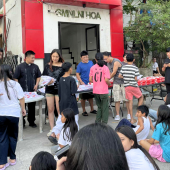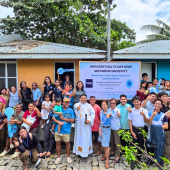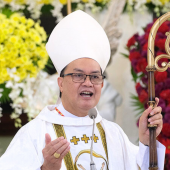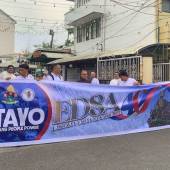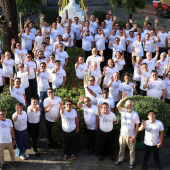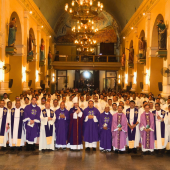From Theology to the Marketplace: A Professor Helps Aeta Farmers Bring Their Harvest to Manila
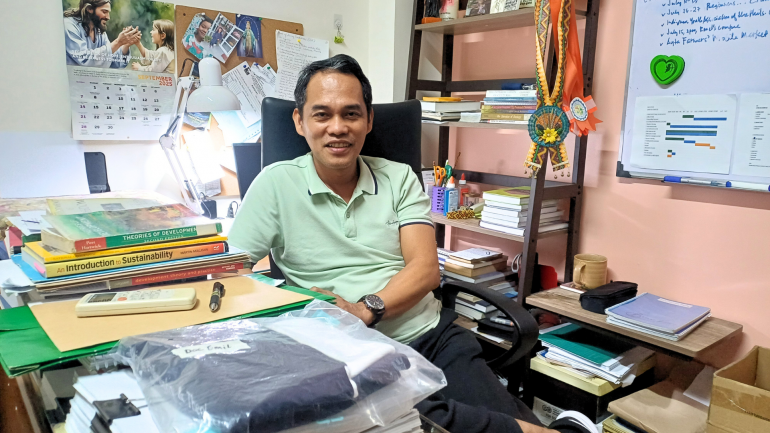
In 2018, Emil Ibera, a lay theology professor who had been teaching pastoral ministry, mission theology, and Catholic social teaching in Manila, traveled to Floridablanca, Pampanga, to conduct fieldwork for his dissertation. His intent was academic. What he witnessed in an Aeta community transformed that intent into a mission.
The Aetas, known as among the earliest inhabitants of the Philippines, had long welcomed researchers. Many came, asked questions, took notes, wrote theses, and left. Their presence rarely brought change. Ibera felt the weight of that history. Theology had taught him that faith without action is dead, and action without justice is blind. Standing in the uplands, he could no longer separate theory from responsibility.
Before even finishing his dissertation, he shifted from gathering data to gathering resources. In 2019, he began a subsidy program to help Aeta farmers avoid borrowing from local financiers who often took more from their harvests than they earned themselves. He tapped a development agency of Austrian bishops, DKA, part of the Catholic Children’s Movement, to purchase seeds, provide rice and basic food supplies, and offer small cash assistance so farmers could begin planting without debt.
“But the struggle did not end with planting,” he said. “The greater challenge emerged after every harvest: how to bring produce from the uplands to actual buyers.”
The farmers could grow ampalaya, squash, sigarilyas, sitaw, eggplants, cassava, sweet potatoes, and bananas—but without access to markets, the crops held little value.
So Ibera built a bridge, not of policy, but of practicality. With the help of students, parishioners, and friends from universities like UP, Ateneo, and Miriam College, he organized transport runs from Pampanga to Metro Manila. Parishes became marketplaces. After Sunday Masses at Santuario de San Vicente de Paul along Tandang Sora, Mt. Carmel Parish in Project 6, and most steadily at the National Shrine of Our Lady of the Abandoned in Santa Ana, Manila, parish courtyards turned into vibrant vegetable stalls. It was common to sell 1,000 kilos of crops on a single day.
Every harvest season, from August to February, Aeta-grown produce now arrives consistently in Metro Manila. Parishioners do not line up to receive aid, they line up to support livelihoods. The Aetas handle packing and delivery. Theologians, nuns, students, churchgoers, and ordinary city dwellers handle the purchasing. In the process, a theory of justice became a system of exchange.
Long before this initiative began, Ibera had spent years teaching that Christian service is not mere charity.
“True justice demands equity, not just equality, especially for those who have been historically deprived,” he said. “The Aetas, despite being legally recognized as indigenous landholders since 2007, still face discrimination, weak policy implementation, and recurring threats to their ancestral domains.”
He often cites the 1971 Synod of Bishops.
“Action on behalf of justice is an integral part of evangelization,” he said.
For him, that means baptism alone does not define authentic faith, solidarity does. Selling vegetables on church grounds is not just economic support; it is a theological witness.
As their partnership deepened, other needs emerged. Aeta leaders lamented that many students reached high school unable to read or write. Though some completed secondary education, only a handful attempted college, and fewer finished.
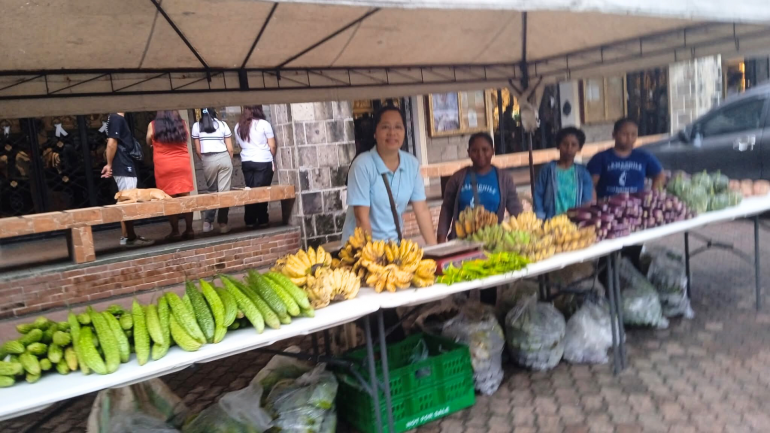
In response, he organized weekly tutorial sessions for junior and senior high school students. By 2022, the program had grown to include college subsidies. Three Aeta youth enrolled that year. Three are now on track to graduate, one by February 2026, two shortly after.
Health also became part of the mission. Medical missions are now held every two months.
“What started as a single intervention grew into three pillars: livelihood, education, and health, all rooted in the same principle of justice expressed through companionship,” he said.
Today, 21 farmers are directly supported, but the goal is not perpetual dependence. The long-term plan is to transition all systems, subsidy, logistics, and marketing into the hands of an officially registered and self-governed Aeta farmers’ organization. Many of those now coordinating deliveries and sales are young Aetas who will one day run the entire enterprise themselves.
The vision is bold yet grounded: that indigenous communities like the Aetas be recognized not as beneficiaries of aid, but as reliable food providers for urban communities. That their land be seen not as territory to be contested, but as ancestral farmland that feeds cities.
Despite progress, social wounds remain. Many Aeta children still endure slurs like “baluga” in schools, words that carry generations of prejudice. Policies may exist on paper, but culture shifts slowly.
“Equality alone is not enough,” he said. “Justice requires equity, a deliberate tilting of the balance toward those long deprived.”
Yet he remains hopeful.
“Discrimination cannot be dismantled overnight,” he said, “but it can be weakened every day through small, consistent gestures of solidarity. Every kilo of ampalaya bought directly from an Aeta farmer is not only sustenance, it is a statement.
“In a time when corruption and indifference dominate headlines,” he added, “efforts like these must be made visible, not for praise, but for proof. To show that while there are forces destroying life, there are also forces defending it.”
For him, this is theology fulfilled, not only in homilies, but in harvests.
(Oliver Samson is a freelance writer based in the Philippines. He contributes regularly to reputed Catholic magazines and platforms both in the country and abroad.)
Radio Veritas Asia (RVA), a media platform of the Catholic Church, aims to share Christ. RVA started in 1969 as a continental Catholic radio station to serve Asian countries in their respective local language, thus earning the tag “the Voice of Asian Christianity.” Responding to the emerging context, RVA embraced media platforms to connect with the global Asian audience via its 21 language websites and various social media platforms.









